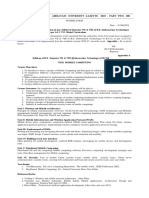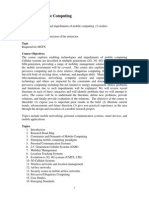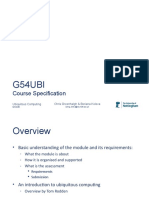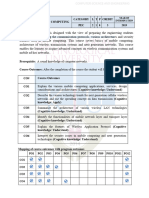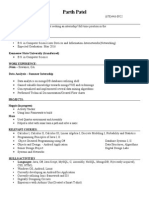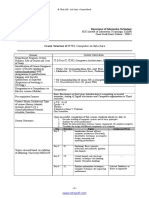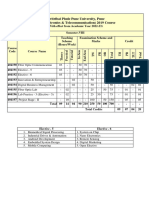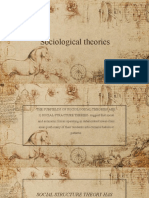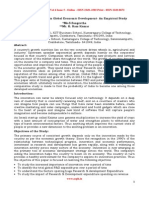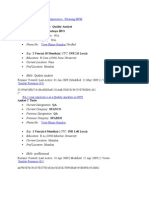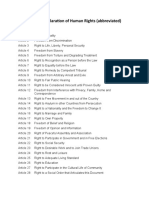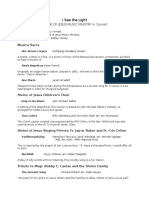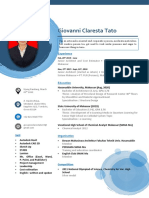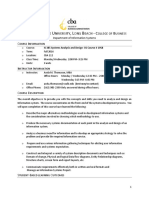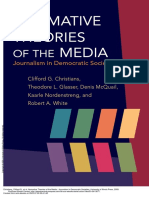Syllabus
Mobile And Ubiquitous
Computing (MUC) Georgia Tech:
CS7470-O
January 7, 2022
Thomas Ploetz
This document describes the general guidelines for and an overview of the MUC class at Georgia
Tech. Use this as a reference throughout the semester. Mentors, TAs, and instructors will assist
you in case there are any questions or concerns.
General Course Information
Mobile and Ubiquitous Computing are often referred to as the third generation of computing
where users continuously interact not with just one but many computing devices. The latter are
thereby embedded into the everyday environment of their users in such a way that
users—ultimately—will not even be aware of their interaction with computers. In this class
students will explore the third generation of computing (and beyond) that enables such
continuous and especially ubiquitous computing. Students will learn about the technical
foundations of sensing and computing that are the prerequisites for smooth and seamless
interactions in a continuous manner. Based on these foundations students will work on practical
projects that address cutting edge real world problems and will develop innovative solutions to it
through means of mobile and ubiquitous computing. Beyond providing a solid technical
foundation for mobile and ubiquitous computing the course will focus on aspects of how to
actually make, that is build and deploy, mobile and ubiquitous computing systems.
Prerequisites
Formal Prerequisites
Undergraduate Semester level CS 2110 Minimum Grade of C or Undergraduate Semester level
CS 2261 Minimum Grade of C.
1
�Mandatory Requirement:
Before students start working on their projects they will need to provide documentation
regarding successful completion of CITI IRB Training — specifically the following courses need to
be completed (or refreshed):
● Responsible Conduct of Research (1 — Basic Course)
● Human Research (Group 2 Social / Behavioral Investigators and Key Personnel — 1 Basic
Course)
Students will have three weeks (at the beginning of the semester) to complete the IRB training
and submit their certificates (PDF) through Canvas (see below).
The CITI IRB online training can be accessed through:
● http://researchintegrity.gatech.edu/about-irb/irb-required-training
and should not take longer than two hours to complete. Students who already have valid, that is
not expired, certificates for the aforementioned courses can submit their certificates directly.
Important: Without valid CITI certification students cannot work on their projects and as such will
not be able to fulfill the requirements of all project-related assignments!
Recommendations
Students shall have a general interest in the subject area of mobile, ubiquitous, pervasive, and
wearable computing. Curiosity and eagerness to not only learn about (and understand) the field
of mobile and ubiquitous computing, but also to make and experiment in practical, hands-on
sessions are of benefit for enjoying the course.
Existing programming skills are of benefit (for mobile platforms, and/or for lower level device
control; for web platforms). For some projects experience with data analysis frameworks such as
Python, R, or Matlab is of benefit. Other projects will build on foundations of electrical
engineering and manufacturing.
Queries Related to Course
Please send your queries related to course work through Canvas Discussions. That way your
request will be visible to all and everyone will benefit from the response from the TAs / instructor
and potential follow-up conversations.
2
�Instructors
Professor
Thomas Ploetz
School of Interactive Computing
thomas.ploetz@gatech.edu (include “MUC S22” in subject line of any correspondence and please
include TAs muc_tas@groups.gatech.edu)
Office hours: Mondays at 5pm EST, starting January 24 on Teams
Teaching Assistants (TAs):
We have a great team of teaching assistants who will look after the various sections of the class
as a team. Their work is coordinated by our head TA and individual responsibilities will be
assigned at the beginning of the semester (and updated here).
Head TA:
● Max Zuo email: zuo@gatech.edu
TAs:
● Sridevi Alawandi email: salawandi6@gatech.edu
● Jonathan Womack email: jonwomack@gatech.edu
● Charles “Chad” Ramey email: cramey7@gatech.edu
● Aarohi Vaidya email: avaidya48@gatech.edu
● Shaili Dalmia email: sdalmia8@gatech.edu
● Gabriel Brittain email: gwbritain@gatech.edu
● Zhe “Ming” Chng email: zchng3@gatech.edu
● Rajandeep Singh email: rajandeep.singh@gatech.edu
● Neeraj Alavala email: nalavala@gatech.edu
3
�TA Office hours
The schedule for TA office hours will be determined at the beginning of the semester (and
updated here). All times in EST.
Time TA Online Link
9am-10am Aarohi Teams Meeting Link
Monday
1pm-2pm Shaili
8am-9am Ming Teams Meeting Link
Tuesday
3pm-4pm Chad
1:30pm-2:30pm Neeraj
Wednesday
5pm-6pm Sridevi Teams Meeting Link
7pm-8pm Jon Teams Meeting Link
Thursday
2pm-3pm Gabriel
12pm-1pm Max Teams Meeting Link
Friday
4pm-5pm Rajandeep Teams Meeting Link
Learning Management System (LMS) — Canvas
Course updates, readings assignments, calendar and any other official information are distributed
through the course CANVAS website. Please visit this site frequently as all formal communication
will go through it. Students who have not used Canvas before are asked to familiarize themselves
with the system. On Canvas the course can be found under:
Mobile and Ubiquitous Computing
All students enrolled into the course are automatically enrolled to it on Canvas.
Course Objectives and Outcomes
This course aims to provide students with an overview and the foundations of the research field
of the third generation of computing (and beyond). Through active, practical explorations the
4
�course aims to provide an appreciation of the practical potential the field offers for researchers
and practitioners.
Course Outline
● Overview of the field and past, present, and future of Ubiquitous Computing
● Prototyping mobile and ubiquitous computing technology
● Sensors and sensor data analysis including applied machine learning
● Eye and gesture based interaction
● Evaluation of mobile and ubiquitous computing systems
● Smart homes and Infrastructure Mediated Sensing
● Overview of wearable computing: Challenges and design processes
● Head mounted displays
● Location technologies and how to use them
● Privacy in mobile and ubiquitous computing
● Context aware computing
● Real world applications: implications and challenges
Intended Outcomes
Knowledge
Upon successful completion of the course students will be able to:
● Build on the foundations of mobile and ubiquitous computing to develop practical
applications;
● Discern the capabilities of different components of mobile and ubiquitous computing,
which allows for informed decisions on the usefulness and usability of resulting interface
and potential technical challenges;
● Exploit the potential of mobile and ubiquitous computing techniques for real-world
applications.
Skills
Through active course participation the students will gain:
● The ability to appreciate and analyze the foundations of the third generation of
computing (Mobile and Ubiquitous Computing)
● The ability to use methods of mobile and ubiquitous computing in innovative, real-world
practical applications.
5
�Course Logistics
Individual Assignment
One reading assignment will be given, which students have to work on individually and hand in
for assessment. Students can earn up to 10% of the overall grade through this assignment. This
assignment will cover an individually written essay about the state-of-the-art in ubiquitous
computing.
Projects
Students will work in groups on one practical project (each) throughout the whole semester. Each
project will be overseen by a mentor. Students will have to organize themselves into groups of at
least four and define the specifics of their project. Project ideas will be provided by mentors but
can also be defined by the students. A pool of mentors (more senior students, PhD students, staff
and faculty members) and project ideas will be available. Every project team needs to find a
mentor and define their project in collaboration with this mentor. Teaching assistants will
support students during the project definition phase to make sure all students will be able to
work on a project they want, find interesting, and lead to achievable results. All projects need to
be discussed with and approved by TAs or the instructor. Part of these discussions is an
adjustment of complexity (by the TAs in discussion with project teams) that will aim at class
appropriate projects — that are neither trivial nor unachievable. Examples of successful projects
from previous semesters will be shared with the students.
Process
Students will form project teams of at least four — as soon as the semester starts. Based on the
initial readings, the example projects from previous years, and on research areas of and
suggestions from mentors, teams will start exploring the wider area of mobile and ubiquitous
computing in order to get an understanding of what interests them and what direction their
project could go. TAs will play an active role in this process and will help students find their
passion. TAs will also give feedback on the intended complexity of a project — ideally it should
be challenging to push students out of their comfort zone and thus to enable learning, whilst at
the same time not being unrealistically over-ambitious. This process will be iterative and requires
substantial work, but —if done well— it will pay off with a project the team will be passionate
about, which will lead to mastery of the field of mobile and ubiquitous computing.
Project pitches will be recorded and shared at the beginning of the semester and students need
to watch the videos to make an informed decision on their projects.
6
�Project Teams
Students are responsible for forming teams of at least four members. Students are encouraged to
enter some basic information about their background, experience, and motivation / interests into
a class-public spreadsheet, which will make the project forming process easier. The link to the
document is given on Canvas.
All members of a project team will fill a team contract in which they formulate their goals and
objectives, their anticipated roles within the project, and their overall ambitions. This contract is a
required deliverable (pass / fail grade) and will be used throughout the project to keep track of
project progress and especially the individual contributions of all team members. See grading
guidelines below.
Deadline for project sign-ups
1/25/2022
Project Deliverables
Projects have the following deliverables that will be graded (totalling to up to 50% of the overall
grade):
● Team contract — not graded but has to be signed by all team members and is binding —
will be used for progress evaluation throughout the semester [due: February 3]
● Project proposal and project teaser video [10% of overall grade; due: February 10]
● Halftime project update (report, video, discussion – details to be specified) [10% of overall
grade; due: March 8]
● Project demo (end of project) [10% of overall grade; due: April 19]
● Project report [20% of overall grade; due: April 21].
Guidelines for writing proposals, report, demo, slide and video presentations are available on
Canvas (Files section).
Grading (Group Components)
For group assignments and project deliverables every team will submit one copy of the
assignment / deliverable to Canvas. Every group assignment must include a statement of the
individual team members’ contributions to the assignment. TAs and instructor will regularly
discuss group participation with every team. All members of a project team will receive the same
grade for the main portion of a deliverable. This is a general rule unless in extreme, well justified
cases that will need to be discussed with TAs, mentor, and instructor. In case of unequal
contributions to a group assignment the grading team will reduce grades on a case by case
basis. TAs will grade the project components using a rubric that corresponds to the guidelines for
students as mentioned above.
7
�Two team evaluation surveys will be conducted throughout the semester (at about half time, and
at the end of the semester) in which each team member assesses the contributions of
themselves and all their team members. For the first evaluation a total of three stars can be given
to each team member. The median of the star evaluation received by a team member determines
a scaling factor for all (!) group and project deliverables. If the median is 3 stars then no scaling is
applied (scaling factor of 1). If it is less than 3 stars then a scaling factor of <1 is applied to all (!)
group and project deliverables – effectively lowering grades for non-participating team members.
The second team survey is based on a four star ranking and follows the same logic as the first
one. However, team members who underperformed in the first half of the semester can make up
for this in the second half. If they really improve their contributions then they can earn up to 4
stars and as such eliminate the down-scaling from the first team survey. Note that no upscaling
(extra credit) will be implemented.
To clarify: The expectation is that each team member contributes such that the workload is
equally shared in a fair way. This has been true for the vast (!) majority of projects in previous
semesters and down-scaling individual grades has been the rare exception. Yet, this instrument
of team evaluation and scaling of grades has proved to be very effective to ensure fair sharing of
workload.
Plagiarism Quiz
Students will have to take a quiz on plagiarism in order to demonstrate that they have understood
the academic code of conduct and are able to work on the class assignments and project
components according to good academic practice. Details of the academic honor code and
pointers to background information are given below.
The plagiarism quiz is available online on Canvas. Students will have an infinite number of
attempts but will have to answer all questions correctly in order to be able to proceed with the
class (pass / fail). Deadline for successful completion of the plagiarism quiz:
1/28/2022
IRB
Students can only start working on their project when they have provided evidence for successful
completion of relevant IRB (Institutional Review Board, which is concerned with ethical approvals
for research conducted at Georgia Tech) training (CITI certificate(s) as outlined above).
All projects are—per definition—class-room (educational) projects and as such—if adhering to
good academic practice as attested through a successful IRB training—are exempt from IRB
approval. However, without proper IRB approval (if required by a project) the results of a project
can NOT be published as such. Publication (for example, in the form of a scientific article) typically
8
�requires IRB approval (depending on the project). Teams aiming for publication of their project
results should discuss with their mentors / the professor to seek advice.
Midterm Exam
The midterm exam provides feedback to students and instructor as a basis for (self-)assessment
of their course progress. The midterm exam will be administered as take-home exam and
students can work on it during the
week commencing March 7
The midterm exam will contribute 10% of the overall grade. All covered materials incl. video
lectures, readings (!), activities, and project components are relevant for the exam. This is an
individualized assessment and no cooperation is allowed. Strict plagiarism / cheating checking
will be implemented.
Final Exam
The final exam will be administered as take-home exam and students can work on it during the
week commencing April 25
The final exam will contribute 10% of the overall grade. All covered materials incl. video lectures,
readings (!), activities, and project components are relevant for the exam. This is an individualized
assessment and no cooperation is allowed. Strict plagiarism / cheating checking will be
implemented.
Grading & Evaluation
Grading Scheme
Overall course grading is based on the Georgia Tech letter grading system (A through F, as
defined at https://registrar.gatech.edu/info/grading-system). The various components of the
course contribute to the overall grade as follows:
Contributions to Overall Grade
component Max. grade contribution
2 graded group exercises: 10%
● Sensor data analysis
● Prototyping
(5% each = 10% overall)
9
� Class participation: 10%
● Readings
● Discussions
● Participation exercises
● In-video quizzes
Individual assignment: The State of Ubicomp 10%
Project deliverables: 50%
● proposal + video [10%]
● Halftime update [10%]
● final presentation and demo [10%]
● final report [20%])
Midterm exam 10%
Final exam 10%
total 100%
TAs will use detailed grading schemes for each component, which ensures fair and objective
grading.
Calculating Final Grades
Each component (as described above) will be graded separately accumulating points towards the
overall course grade. The final, overall course grade is then calculated as follows:
Accumulated percentage grade
90-100% A
80-89% B
70-79% C
60-69% D
<60% Not passing
10
�Learning Resources
Textbook
We will make use of the following textbook:
Krumm, J. (2009). Ubiquitous Computing Fundamentals (1st ed.). Chapman & Hall/CRC.
http://www.amazon.com/Ubiquitous-Computing-Fundamentals-John-Krumm/dp/1420093606
This semester we will put more focus on scientific articles rather than on a single textbook. The
majority of the readings will be provided through the course website. For some assignments —
and of course for the project work — students are expected to conduct their own, independent
literature research (and reading).
Hardware Kit
Some of the exercises will require rapid prototyping with microcontrollers, sensors, and common
items like safety glasses and straws. We will attempt to keep the cost for these items under $35
and will provide links to places that the hardware can be purchased. In some instances, we will
make group purchases to reduce the cost and students can purchase the hardware through the
course.
For the prototyping exercise, as well as for general prototyping activities, we will use the
following kit, which students are asked to purchase at the beginning of the class:
Name ELEGOO UNO Project Super Starter Kit with Tutorial and UNO R3 Compatible
with Arduino IDE
Description Starter kit for Arduino-like prototyping containing breadboard, jumper cables,
selection of sensors and actuators, power supply, tutorial etc. Compatible
with Arduino UNO R3, MEGA 2560 R3, NANO.
11
� Purchasing https://tinyurl.com/MUChardware (Amazon, likely to be available elsewhere
option as well)
Approximate $35
cost
Note If students already have access to similar hardware, then there is no need to
purchase. Yet, in-class activities and potentially project work is based on
access to hardware like this.
Readings
Students are expected to read the required readings prior to the session when they are due.
Class exercises and discussions and any examinations will assume familiarity with any reading
material or videos as distributed through the course website. All the readings and when they are
due will be posted on the Canvas.
Course Policies
Accommodations for Students with Disabilities
If you are a student with learning needs that require special accommodation, contact the Office of
Disability Services at (404)894-2563 or http://disabilityservices.gatech.edu/, as soon as possible,
to make an appointment to discuss your special needs and to obtain an accommodations letter.
Please also e-mail the head TA and the professor as soon as possible in order to set up a time to
discuss your learning needs.
12
�Anti-Harassment Policy
We will implement a strict anti-harassment, zero tolerance policy in line with the institution’s
general anti harassment policy as it is defined here:
http://titleix.gatech.edu/anti-harassment-policy
Honor Code
Students are expected to follow the Georgia Tech Honor Code, available at
http://osi.gatech.edu/content/honor-code, including but not limited to the section on plagiarism
(see below). Thanks for reading this far! We love it when students read the syllabus. If you’re
reading this, please send a private email message to the instruction team (Professor and Head
TA; include 7470 in the subject line) with a picture of a Ubicomp-related meme in it to receive a
bonus toward extra credit. Please don’t tell your classmates about this little Easter egg though –
we want them to discover it on their own! This offer expires two weeks after class started
(January 23).
Group Work
Group work is explicitly encouraged for the project students will be working on throughout the
course. Project reports will be written in groups (all members of a team submit the same report
and receive the same grade). Group discussions in the classroom will be fostered — at
appropriate times — throughout the course.
Academic Misconduct: Plagiarism & Cheating
Georgia Tech aims to cultivate a community based on trust, academic integrity, and honor.
Students are expected to act according to the highest ethical standards. For information on
Georgia Tech's Academic Honor Code, please visit
ttp://www.catalog.gatech.edu/policies/honor-code/ or
http:// www.catalog.gatech.edu/rules/18/.
Any student suspected of cheating or plagiarizing on a quiz, exam, or assignment will be reported
to the Office of Student Integrity, who will investigate the incident and identify the appropriate
penalty for violations. Instructor(s) and TAs will implement a zero-tolerance policy on plagiarism &
cheating. This policy is based on the Code of Conduct as cited by the Georgia Tech Honor Code.
As per the Georgia Tech honor code, plagiarism is defined as “Submission of material that is
wholly or substantially identical to that created or published by another person, without adequate
credit notations indicating authorship (plagiarism);“ [http://osi.gatech.edu/content/honor-code]
Plagiarism or any other kind of cheating as defined by the Georgia Tech Code of Conduct will
13
�result in failing the course. As a reminder it is worth noting that class exercises will be treated the
same way as any other material that shall be submitted by students. Signing up for anyone else
other than oneself is considered forgery and counts as cheating for both parties involved.
Submission Policy
All work needs to be submitted through Canvas using the Assignments feature. For group
assignments only one submission per team has to be made. We will use the group feature in
Canvas as soon as project teams are finalized. TAs will assist students with submissions.
Acceptable format for written reports is PDF (only).
Acceptable format for slides submission (not presentation) is PDF (only). Use your favorite
presentation software for the presentation in class but please export slides to PDF for submission
to Canvas. Alternatively, students may submit links to online resources (such as Google Slides)
that can be used for in-class presentations.
When submitting videos, please use standard codecs that can be played on either Mac or
Windows machines (test before). However, it is strongly encouraged to rather provide links to
online resources (such as youtube) were the videos have been uploaded.
Extensions, Late Assignments, & Re-Scheduled / Missed Exams
Late assignments will not be accepted without a suitable excuse (doctor’s note, police report,
etc.). Note that extenuating circumstances have to be brought to the instructor’s attention before
the fact — through the regular channels, that is do not send doctor’s notes to the instructor or
TAs but rather send them to student services who will get in touch with the instructor. Late
submission without evidence of extenuating circumstances will result in zero marks for the
particular component. In case of a planned absence (e.g., for interviews) students are required to
communicate this well in advance such that the team and instructor can discuss options. In case
of unplanned yet excused absences (illness etc.) instructor and team will discuss options on how
a student can make up what has been missed. Missing a quiz — without evidence of extenuating
circumstances as defined before — will result in failing the quiz and thus zero marks for this
component.
However, in case of extenuating circumstances as defined before quizzes / exams may be
rescheduled or other accommodations discussed— according to the official Gatech policy and
procedure. In any case it is strongly advised to consult with the instructor well in advance (at least
one week notice) should extenuating circumstances result in extraordinary difficulties with the
schedule. Within the constraints of fair treatment and within reason we will always aim for finding
a satisfying solution.
14
�Campus Resources for Students
In your time at Georgia Tech, you may find yourself in need of support. Below you will find some
resources to support you both as a student and as a person.
Academic Support
● Center for Academic Success http://success.gatech.edu
○ 1-to-1 tutoring http://success.gatech.edu/1-1-tutoring
○ Peer-Led Undergraduate Study (PLUS) http://success.gatech.edu/tutoring/plus
○ Academic coaching http://success.gatech.edu/coaching
○ Residence Life's Learning Assistance Program
● https://housing.gatech.edu/learning-assistance-program
○ Drop-in tutoring for many 1000 level courses
○ OMED: Educational Services (http://omed.gatech.edu/programs/academic-support)
○ Group study sessions and tutoring programs
○ Communication Center (http://www.communicationcenter.gatech.edu)
○ Individualized help with writing and multimedia projects
● Academic advisors for your major
○ http://advising.gatech.edu/
Personal Support
Counseling Center counseling.gatech.edu 404-894-2575
Dean of Students (Student Life) studentlife.gatech.edu 404-385-8772
GT Police police.gatech.edu 404-894-2500
Stamps Health Services health.gatech.edu 404-894-1420
Georgia Tech Resources
Academic Advisors (advising.gatech.edu/) in each school help students navigate degree
requirements and take advantage of campus resources to ensure their success. Instructors can
ask advisors for input on situations involving specific students, and they should send struggling
students to advisors for help and direction.
The Center for Academic Success (success.gatech.edu/) offers a variety of academic support
services to help students succeed academically at Georgia Tech (e.g. tutoring, peer-led study
groups, study skills, etc.).
15
�The Communication Center (communicationcenter.gatech.edu/) provides support for students
with respect to developing competency and excellence in written, oral, visual, electronic, and
nonverbal communication.
The Library (library.gatech.edu/) provides students with many services besides borrowing
privileges including access to technology and technical assistance, online access to many
journals and databases, and subject and personalized research assistance. You can place course
materials on reserve behind the reference desk or request a librarian teach an instructional
session for your class.
The Office of Disability Services (disabilityservices.gatech.edu/) ensures that students with
disabilities have equal access to all programs and activities offered at Georgia Tech. They provide
documentation and officially sanctioned requests for accommodation for students, and serve as a
resource for instructors as they build learning environments to meet the needs of all students.
OMED: Educational Services (omed.gatech.edu/) is the unit charged by Georgia Tech with the
retention, development, and performance of the complete student learner who is traditionally
underrepresented: African American, Hispanic, and Native American. OMED’s programming and
academic support services are aimed at equipping all students with strategies to navigate the
Georgia Tech environment.
The Division of Student Life (studentlife.gatech.edu/; 404-894-6367; Smithgall Student
Services Building 2nd floor; You also may request assistance at
https://gatech-advocate.symplicity.com/care_report/index.php/pid383662?) – often referred to
as the Office of the Dean of Students – offers resources and support for all students in our
community. You can refer students to Student Life, or contact them for help identifying
appropriate campus resources and resolving problems with students.
Counseling Center ( http://counseling.gatech.edu; 404-894-2575; Smithgall Student Services
Building 2nd floor)
● Services include short-term individual counseling, group counseling, couples counseling,
testing and assessment, referral services, and crisis intervention. Their website also
includes links to state and national resources.
● Students in crisis may walk in during business hours (8am-5pm, Monday through Friday)
or contact the counselor on call after hours at 404-894-2204.
● Students’ Temporary Assistance and Resources (STAR):
http://studentlife.gatech.edu/content/need-help
● Can assist with interview clothing, food, and housing needs.
● Stamps Health Services: https://health.gatech.edu; 404-894-1420
● Primary care, pharmacy, women’s health, psychiatry, immunization and allergy, health
promotion, and nutrition
● OMED: Educational Services: http://www.omed.gatech.edu
● Women’s Resource Center: http://www.womenscenter.gatech.edu; 404-385-0230
16
� ● LGBTQIA Resource Center: http://lgbtqia.gatech.edu/; 404-385-2679
● Veteran’s Resource Center: http://veterans.gatech.edu/; 404-385-2067
● Georgia Tech Police: 404-894-2500
National Resources
The National Suicide Prevention Lifeline provides free and confidential support 24/7 to those in
suicidal or emotional distress at 1-800-273-8255
The Trevor Project provides crisis intervention and suicide prevention support to members of the
LGBTQ+ community and their friends. They are available 24/7 by telephone (1-866-488-7386),
chat (http://www.thetrevorproject.org; 3-10pm Eastern, 7 days a week), and text (Text “Trevor” to
1-202-304-1200; available 3-10pm, M-F).
Statement of Intent for Classroom Inclusivity
As members of the Georgia Tech community, the instructor / TAs / mentors are committed to
creating a learning environment in which all of our students feel safe and included. Because we
are individuals with varying needs, we are reliant on student feedback to achieve this goal. To
that end, we invite you to enter into a dialog with us about the things we can stop, start, and
continue doing to make the classroom an environment in which every student feels valued and
can engage actively in our learning community.
17

















